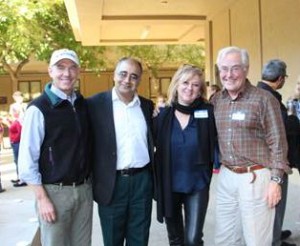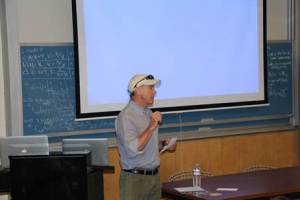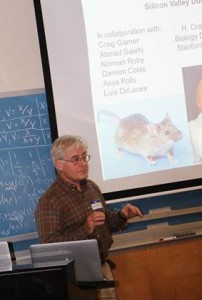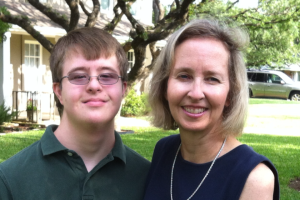
(left to right) LuMind Foundation co-founder Jim White, Stanford University’s Dr. Ahmad Salehi , LuMind Executive Director Carolyn Cronin, and Stanford University’s Dr. Craig Heller.
The LuMind Foundation returned to its Bay Area roots on November 2, 2014 with a well-attended research presentation at Stanford University. More than sixty people filled the room to listen to Drs. Craig Heller and Ahmad Salehi discuss new developments and achievements in their research. Jim White, one of the founders of what was then known as the Down Syndrome Research and Treatment Foundation, was also on hand to greet participants and talk about their commitment to Down syndrome cognition research.

Jim White, one of LuMind Foundation’s co-founders, addresses the crowd at the event.
Nutrition and sleep were among the topics discussed. Sleep apnea remains a challenge for many individuals with Down syndrome and is tied to a number of health issues, including diabetes, high blood pressure, stroke, and heart problems.
Dr. Salehi also talked about an asthma drug, formoterol, which in large doses has been shown to improve learning and memory in a mouse genetically engineered to mimic Down syndrome in humans by carrying extra copies of genes. At lower doses, this drug is already FDA approved to treat asthma and chronic obstructive pulmonary disease (COPD).
Because over 70% of individuals with Down syndrome suffer from sleep apnea, it is reasonable to think that respiratory issues are common in this population and therefore treatments that target both cognition and respiratory problems, like formoterol, are especially interesting to researchers.
At the conclusion of the presentation, Dr. Heller led a tour of his lab, which was especially popular with the children in attendance.
The LuMind Foundation remains committed to supporting this and other research to find treatments that will improve memory, speech, and learning in people with Down syndrome. We would like to thank Drs. Heller and Salehi and Jim White for sharing their insights with us. We also appreciate Sara Wernikoff’s hard work organizing the event. And of course, thank you to everyone who attended the presentation.


